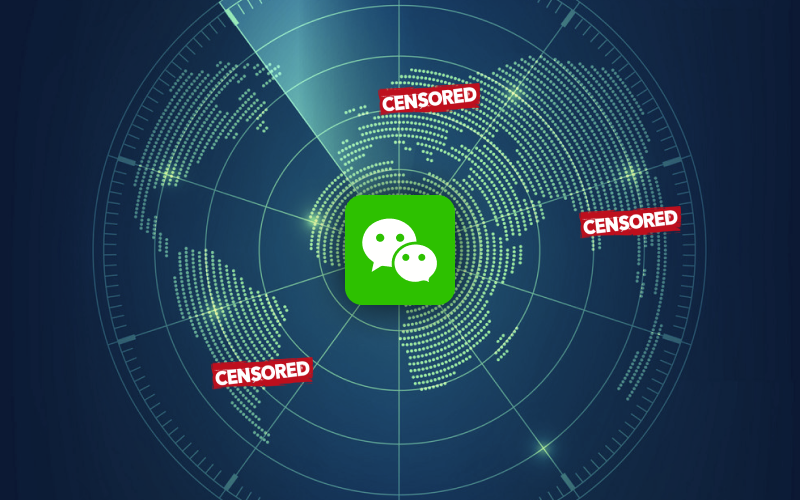WeChat Scans International Accounts to Build Up Censorship Algorithms
14 May 2020

“Censorship reflects society’s lack of confidence in itself. It is a hallmark of an authoritarian regime.” – Potter Stewart, Former Associate Justice of the Supreme Court of the United States
Researchers of CitizenLab have revealed that a popular Chinese messaging app called WeChat systematically analyzes the content sent out by international users to have a better idea of what content should be banned for accounts registered in China. [1]
While censorship woes and the privacy-invading actions of the Chinese government would not be surprising to anyone who keeps an eye on the news or knows about the existence of The Great Firewall [2], the research unveils more details about how exactly the process is accommodated, and how users outside of China inadvertently help improve digital repression in China.
If that is not a good enough reason to motivate international users to do the right thing, they might want to know that content monitoring can be applied to identify and to create a portfolio on them.
The Scope of The Critical Surveillance Problem
WeChat is more than a simple messenger, and that’s not a slogan.
It can serve its users as a news provider, and a paying service for various goods. It also has 1,165 billion monthly active users [3], which makes it the third most used instant messenger in the world, only coming behind WhatsApp and Facebook Messenger.
The app has been downloaded more than 100 million times on Google’s Play Store, which is mostly inaccessible in China. WeChat is also available on App Store, where we can find a privacy policy document stating that data passes through WeChat servers so it can be distributed to users you’re communicating with. In other documents, the language describing user data processing is more ambiguous.
WeChat international terms of service [4] clarify the following in its “your content” section:
- You are giving us and our affiliate companies a perpetual, non-exclusive, transferable, sub-licensable, royalty-free, worldwide licence to use Your Content (with no fees or charges payable by us to you) for the purposes of providing, promoting, developing and trying to improve WeChat and our other services, including new services that we may provide in the future.
All such use will, to the extent Your Content contains Personal Information, be in accordance with our WeChat Privacy Policy. As part of this licence, we and our affiliate companies may, subject to the our WeChat Privacy Policy, copy, reproduce, host, store, process, adapt, modify, translate, perform, distribute and publish Your Content worldwide in all media and by all distribution methods, including those that are developed in the future;
- We may share Your Content with third parties that we work with to help provide, promote, develop and improve WeChat in accordance with the WeChat Privacy Policy;
In addition, you agree that we and our affiliate companies (subject to these Terms, our WeChat Privacy Policy and applicable laws and regulations):
- are allowed to retain and continue to use Your Content after you stop using WeChat;
The full terms of service document can be found via the link provided before the list. When researchers from Citizen Lab contacted Google and Apple representatives about the inconsistency in documents, no information was offered in response.
WeChat and Tencent, the technology giant that owns the app, also declined to provide any comments.
The Results of Citizen Lab Research on WeChat
Earlier this year Citizen Lab has found evidence of WeChat blacklisting more than 500 keyword combinations regarding coronavirus outbreak and Wuhan whistleblower Dr. Li Wenliang. [5]
The team did not stop there and decided to run tests between November and January to prove that WeChat screens images shared by users outside of the People’s Republic of China, adding a digital signature to any unwanted material, which then becomes inaccessible for viewing by China-registered users.
For one of their first experiments, CitizenLab representatives sent a sensitive image from a non-China registered account to a public group containing other international users.
When the image with the same hash was delivered to a group with China-registered users, the image was not received. The image depicted Liu Xiaobo, a human rights advocate, a writer, and an unpopular figure among state representatives. [6]
The experiment was carried out around twenty times, finding out that communication in WeChat conducted by non-China registered users is also subject to content surveillance. Additionally, secondary checks are carried out to verify that no sensitive content can be seen by users from China.
All files perceived as being politically sensitive are then used to build up WeChat’s Chinese political censorship system.
While Chinese citizens are limited to their choices of communication methods, international WeChat users might take into consideration that their actions within the app not only undermine their personal rights but diminish what’s left of them in the People's Republic of China.
